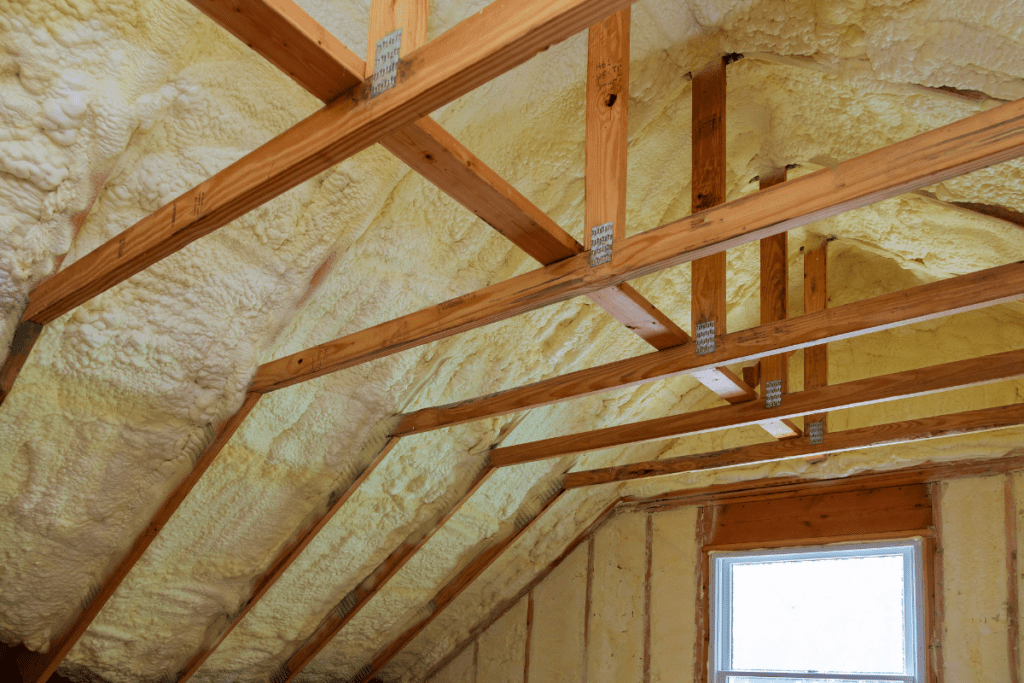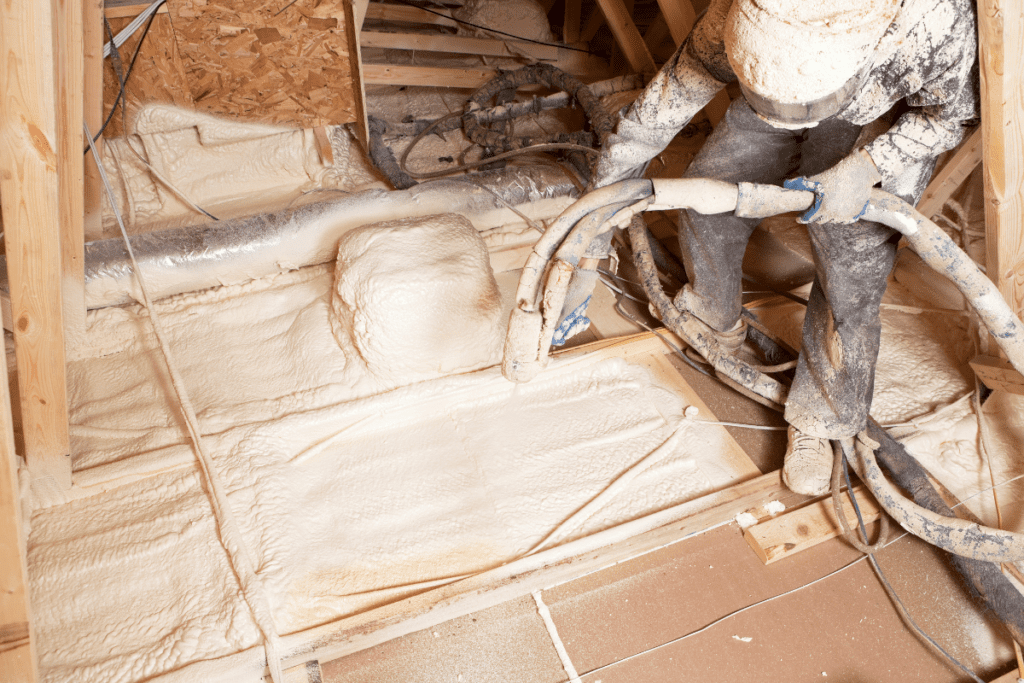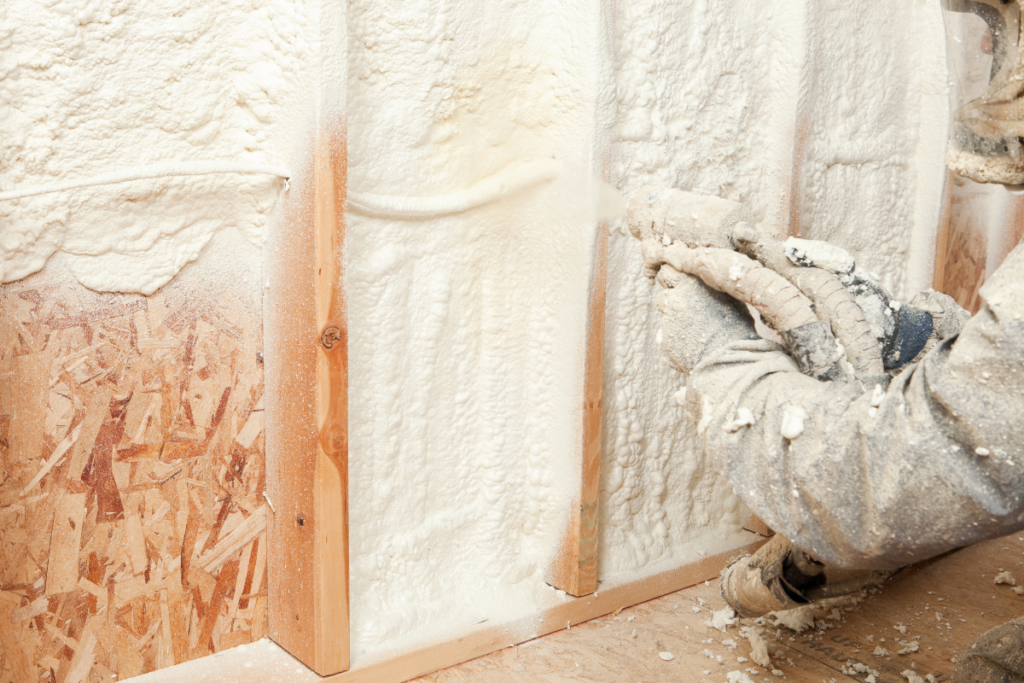There has been increasing attention into the use of spray foam insulation in recent months, as many people are looking for effective ways to keep their homes warm and save money on bills. However, this has encouraged some mortgage lenders and RICS to highlight the potential risks associated with spray foam insulation and ensure homeowners are informed.
Request a Spray Foam Insualtion Consultation to determine whether your property is suitable.
In fact, the Nationwide Building Society – Britain’s biggest mortgage company – claims that it now requires ‘documentary evidence’ that spray foam insulation has been effectively installed before approving a mortgage with this kind of insulation, whereas some lenders won’t entertain it at all. This is a result of many homeowners using ‘cowboy’ firms, who use the wrong type of spray foam or fail to check its suitability for the property. Nationwide claims that improper spray foam insulation can cause structural damage to the property, and thus result in expensive bills further down the road. A recent article from the BBC reported one homeowner having used a ‘cowboy’ firm which resulted in £4,500 worth of damage. For this reason, the leading mortgage lender wants to ensure that homeowners are using reputable firms. Other lenders have also pointed out the issue, with some withdrawing applications after learning about spray foam insulations that were not effectively carried out.
Consequently, RICS have pleaded with homeowners to seek professional guidance from an independent surveyor before having spray foam installed. They can provide expert advice about whether spray foam is suitable for your property as well as insight into which type is most suitable. A RICS spokesperson claims the Institute supports regulation of spray foam insulation, in the hopes of preventing people from being subject to cold call sellers targeting at-risk groups, such as the elderly. Getting help from professionals that you can trust and staying informed is critical in avoiding the pitfalls of improper spray foam insulation.
What is spray foam insulation?

Spray foam insulation (SPF) is a versatile way of keeping homes warm. Spray foam is a liquid foam made up of isocyanate and polyol resin. These compounds expand when they are combined and sprayed, creating a barrier. It can be used on a variety of areas such as walls, roofs, lofts and more, to keep a property insulated. It’s considered, by many, as an effective form of insulation, and can reduce the need to heat homes.
There are two types of spray foam; open-cell and closed-cell spray. Open-cell spray foam is more flexible and soft, which makes it slightly easier to remove. Closed-cell spray foam is sturdier and more resistant to air and moisture transference. Due to its stability and rigidity, closed-cell spray foam can be more difficult to remove than open-cell spray foam.
What are the benefits of spray foam insulation?
Beyond saving on energy bills, there are other advantages to having spray foam insulation. The application method means that it can be applied to almost any place -even those that are hard to get to. It’s the only type of insulation able to do this, which is why it’s so popular given the issues mould and damp can cause. Other benefits of spray foam insulation include its ability to improve air quality inside the property, and in some cases, act as a sound barrier and thus improve sound proofing. Finally, spray foam insulation is long lasting and considered by some to be sustainable.
What are the negatives of spray foam insulation?
Despite the multiple benefits of spray foam insulation, there are some significant drawbacks that need to be considered. It’s more expensive than most other forms of insulation, and requires a professional to install it. Spray foam is also messy and difficult to remove once its installed, so it’s something you want to be sure about before committing yourself. Furthermore, it can hide defects, for example if water ingress occurs, the timbers can become susceptible to decay and are completely hidden from view.
Arguably the major risks involved are related to the insulation process. As highlighted, if it is not carried out by a professional with expert knowledge, you may risk causing significant damage to the property in years to come. There are also health concerns if you are exposed to the spray foam before it has cured.
Word from the director at CJ Bloor: “As far as I’m concerned, you should avoid spray foam insulation installed until such time that the industry becomes regulated and there is proper guidance provided by RICS. In my experiences, having spray-foam insulation installed can seriously impact a property’s saleability in the future.”
Where should you not use spray foam insulation?

There are certain situations or places where spray home insulation should not be used, including:
- areas that are close to light or electrical boxes. Importantly, this includes ceiling light boxes. The chemicals used in spray foam insulation are flammable, which means there is a risk of fire if they expand too far or trap too much heat. Instead you might want to opt for low-expanding foam, however it’s extremely important to get expert advice beforehand.
- closed-cavity areas, such as the space between studs and enclosed cavities in walls. Spray foam expands at a rapid rate, which can be damaging to structures. Instead, an injection foam which expands more slowly is advised.
- doors and window frames. If you use a high expansion insulation here, the pressure could be too much for the frames and cause them to come away from the wall.
- to waterproof any area. Spray foam can break down if it comes into contact with too much water.
- old or historic buildings. Whether to spray foam an old property or not should be decided with the help of a surveyor. It has become widely recognised that listed buildings with historic roofs have higher moisture levels where spray foam has been used, which can promote decay, rot, mould and other structurally-damaging issues.
Clearly there are hazards with using spray foam insulation in the areas listed above. However, each property is individual, which is why the decision to use spray foam or not requires independent and expert deliberation.
Why do mortgage companies dislike spray foam insulation?
As discussed, many banks and mortgage lenders are issuing warnings to homeowners about the use of spray foam insulation. This is due to the potential damage spray foam can cause if it is not carried out appropriately for the building, together with the risk of hiding existing, or future defects mainly related to decay in timber.
Generally, most mortgage lenders and no equity release providers are hesitant when it comes to properties with spray foam insulation. It can negatively impact the home’s market value as well as energy efficiency rating, if installed incorrectly. Some lenders also focus on the type of spray foam used, as open-cell spray foam can be removed more easily than closed-cell.
If you’re considering buying or selling a property with spray foam insulation, it’s highly advised to contact a surveyor who can give you impartial and expert advice.
What are the other types of loft insulation?
Beyond spray foam, there are many other ways to insulate your loft. The most popular type of loft insulation in the UK is fibreglass – also known as glass wool. It’s also one of the most affordable, made from spinning sand with melted glass together to create fibres, which are then fused together by resin. Other materials that are used for blanket insulation include mineral wool, made from volcanic ash, and sheep’s wool, which is more expensive than mineral and glass. You could also consider insulation boards or slabs, blown-fibre or loose fibre insulation, giving you plenty of options.
Each material and each type of loft insulation has its pros and cons, which means that the best choice will depend on your property (and budget). This is where speaking to an expert can help.
If you’re still unsure about whether to get spray foam insulation, or are interested in a property that has one, it’s definitely worth speaking to a surveyor. This way, you’ll know whether it’s the right choice for your property and the specific area to be insulated, or whether to invest in a property that already has it.




